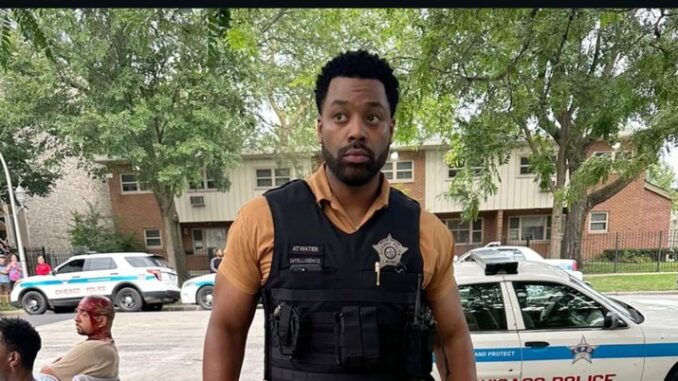
Chicago P.D., where bullets fly and justice is often blurred, few characters walk a line as complex and emotionally raw as Kevin Atwater. A Black man wearing a blue uniform, Atwater is a character constantly pulled in two directions—his loyalty to the badge, and his duty to his community. In a show where every case is a warzone and every decision has consequences, his journey isn’t just compelling—it’s a mirror to real-world injustice.
Atwater isn’t the loudest member of the Intelligence Unit. He doesn’t carry Voight’s rage, Ruzek’s volatility, or Upton’s emotional armor. Instead, he brings a quiet strength, a calm integrity, and a moral clarity that makes him stand out. But those qualities are often tested—not by criminals, but by the very system he serves.
Let’s rewind to the episode that changed everything: “Night in Chicago” (Season 7, Episode 13). What started as a routine evening turned into one of the most emotionally explosive episodes in the show’s history. Atwater, off-duty and heading home, is pulled into a situation involving two fellow cops who racially profile and violently confront a young Black man. When the truth comes out, Atwater is left with a choice: cover it up and protect the blue wall, or speak the truth and risk his career—and his life.
It’s a decision that reverberates throughout the series. Because while his honesty earns admiration from fans, it earns something else from the department: targeted retaliation. Atwater becomes a pariah within the CPD. He’s followed. Harassed. Threatened. The same brothers in blue who once had his back now look at him with suspicion. And that’s the heart of his story: what happens when justice is only conditional?
This storyline struck a chord with audiences for good reason. It aired during a time when the real world was grappling with the deaths of George Floyd, Breonna Taylor, and countless others. While many shows remained silent or tiptoed around the topic of race and policing, Chicago P.D. leaned in. It didn’t just tell a story—it sparked a conversation.

And no one could have carried that weight better than LaRoyce Hawkins, whose portrayal of Atwater is nothing short of masterful. With every scene, he brings a depth and vulnerability that makes you feel the pressure of Atwater’s world. In one particularly heartbreaking moment, Atwater says: “Being Black and being a cop—you think they cancel each other out, but sometimes it just feels like I got two targets on my back.” That line isn’t just good writing. It’s truth. And it hits like a punch to the chest.
The emotional fallout doesn’t stop there. In later episodes, Atwater faces betrayal from inside the force, especially from officers who once called him “brother.” He’s boxed out of investigations. He receives threats at home. He walks into rooms where the silence is louder than any gunfire. And yet—he doesn’t break. He doesn’t lash out. He doesn’t quit.
water’s character arc so powerful. He doesn’t become jaded. He doesn’t turn his back on justice. Instead, he becomes a better cop—not in spite of the challenges, but because of them. He demands accountability not just from the people he arrests, but from the system that gives him the power to arrest them. And in doing so, he becomes one of the show’s true moral centers.
But Chicago P.D. doesn’t let us forget how lonely that path is. Even within the Intelligence Unit—a close-knit group where loyalty is everything—Atwater often stands alone. Voight, despite his respect for Atwater, doesn’t always have the answers. The rest of the team supports him in words, but the silence in some episodes is deafening. That’s not a flaw in the writing—it’s a reflection of reality. Because standing up to systemic injustice often means standing alone.
One of the most gripping episodes later in the series shows Atwater being forced to protect a white supremacist suspect from street retaliation. It’s the ultimate test of his values. Protecting someone who would see him harmed. Upholding a system that doesn’t always uphold him. And yet, he does it. Because the law has to mean something—even when it fails you.
Viewers took to social media to praise the show’s courage in spotlighting Atwater’s struggle. Many Black viewers, in particular, voiced how much they saw themselves in his story—the duality, the exhaustion, the hope. And that’s the real achievement of the Atwater arc: it’s not just good television. It’s necessary television.
The writers deserve credit for not letting this storyline end in a neat bow. Racism doesn’t vanish in one episode. Justice isn’t restored by one brave cop. The trauma lingers. The wounds stay open. But so does the fight.
In a genre often dominated by action and fast-paced investigations, Kevin Atwater’s story gives Chicago P.D. its heart. He reminds us that the badge is heavy—not because of its weight, but because of what it represents. It can protect. It can oppress. And it can change—if enough people like Atwater refuse to look away.
